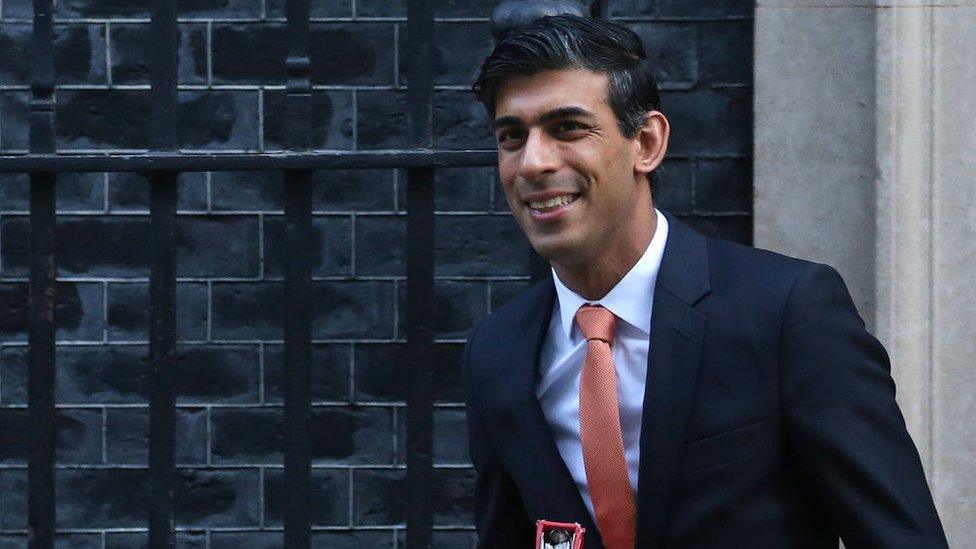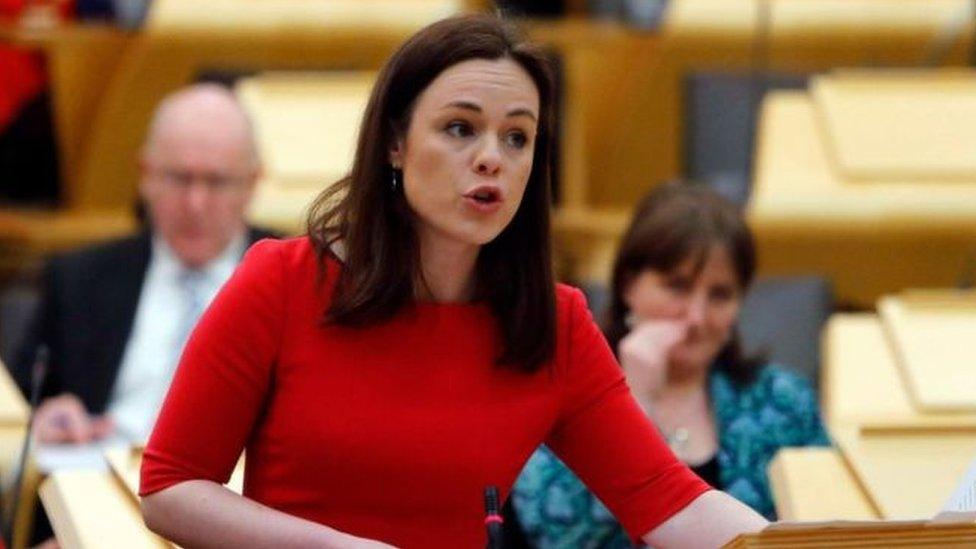Out with the old money, in with the new
- Published

There were crowd-pleasing giveaways in Rishi Sunak's summer splurge, but business was underwhelmed at the measures many desperately need to get through the short term.
Some projects don't cross the border, giving the Scottish government the flexibility to do things differently. A cut in homes transaction tax, for instance, could be better deployed.
But looking into the numbers, the Scottish government reckons most of the funding is already committed, and very little has resulted from the statement in genuinely new funds.
Rishi Sunak has does it again - the fiscal magician who gives a bigger cut in VAT than the hospitality industry dared to expect.
The chief executive of the Scottish Tourism Alliance could barely contain his delight. This was "hugely welcome, a "huge boost" and a "huge relief".
Yet again, this giveaway Chancellor, was splurging, with £30bn in one summer statement.
They'll be toasting him in pubs, even though booze still carries a 20% VAT rate, and in restaurants, where he's giving up to £10-per-head to enjoy a meal out - Monday to Wednesday, during August, children included, but not your drinks bill.
Accountants will be toasting him too, as pubs now have three rates of VAT, including zero rating for cold, takeaway food.
Rishi-burger
While there was a welcome for much of what the Chancellor announced with this extraordinary summer statement for an extraordinary summer, business was underwhelmed.
A £1,000 grant for retaining someone in a job from November to the end of January, having previously been on furlough, adds up to a big sum, if it reaches anywhere close to the nine million people who have been furloughed. Yet much of it will be spent on people who would remain in jobs anyway, so it's not much of an incentive for them, and not targeted.
A cut in English and Northern Irish homes transaction tax, or stamp duty, might give some people the feeling that this is a good time to buy, but it's likely to raise the purchase price by roughly the amount of tax saved.

Home sales may go up - but so too may prices
The £10-per-head August meal voucher scheme could help some restaurants a bit, but it risks being merely a pricey "Rishi-burger" gimmick.
The capital projects included in the Prime Minister's speech last week - almost all of them commitments made before the coronavirus crisis hit - were not topped up with additional sponduliks.
And there wasn't anything to address the more urgent need of businesses, particularly small ones, which are burning through cash, through the grants they received many weeks ago, through the loans they've taken out, and many of which have had to spend more to prepare their workplaces or public spaces for infection control.
Other priorities?
Scotland gets the chance to go its own way on some of this. The additional E2000 apprenticeship grant, for instance, doesn't apply north of the border, so the Scottish government can choose whether that fits with its different training regime.
The £5,000 grants for energy efficiency home improvement is also one that stops at the border, and Scottish finance secretary Kate Forbes decides if it's an idea worth borrowing.
The cut in home transaction tax? That's devolved too, so no benefit to home buyers in Scotland, but high expectations from the property industry that it should be copied to boost activity in Scotland.
Are there other priorities, with which to spend the £800m of extra funding that's coming the way of the Scottish Parliament, after today's Westminster statement?
Fiendishly complex
Better hold on there, because that money may not be as it seems. The Scottish government has looked at the money coming its way. Some £97m of it is already committed, as of Monday, to arts and culture. A large share of it is extra funding to help the NHS through its crisis. Likewise, it's already committed.
Another portion is to fund additional emergency calls for personal protective equipment (PPE) in frontline public services.
Ms Forbes claims that only £21m was announced anew as a result of Rishi Sunak's Wednesday statement. That's a long way short of £800m.

Scottish finance secretary Kate Forbes will decide if many of the schemes are worth replicating
The Treasury has told officials in St Andrew's House that those home improvement grants are not new money, but money shifted from another Whitehall budget. So no new funds there for Holyrood.
The funds that could come from the stamp duty cut should result in an adjustment to the block grant for Holyrood, using the fiendishly complex fiscal framework. But that's not included, and not clear yet how much will be involved.
Only the apprenticeship scheme seems to have new funds attached, and the Scottish government's take is that it doesn't stack up to being quite as big a deal as it might have sounded.
Shiny new projects
That Barnett formula, by paring new spending down to the minimum the Treasury thinks the devolved administrations deserve, is an excellent tell-tale sign of what's really behind a Chancellor's rhetoric.
So, it seems many of the shiny new projects to boost the jobs plan are being funded from other projects that don't look so shiny any more, or simply don't need funding through the crisis.
Kate Forbes addresses the Scottish Parliament on Thursday, with her response to the jobs plan. She will surely complain about the lack of funds and the lack of flexibility she had asked for.
But if she wants to emulate Rishi Sunak with giveaways and spending programmes to help create jobs and stimulate the economy, she may have to burrow into other, existing Holyrood budgets.
That may be no bad thing. Too much can be made of "new money", particularly by opposition politicians and those of us in the media, when it may not be necessary if old money can be better deployed. But making those choices is difficult.
